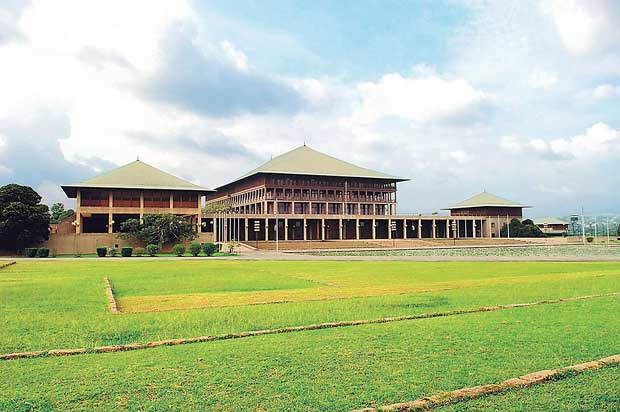Reply To:
Name - Reply Comment
Last Updated : 2024-04-25 20:04:00

The Yahapalana Government seems to be fond of being caught in unnecessary troubles and controversies. It could have got the two recent Bills on Provincial Council elections- the 20th Amendment to the Constitution and the Provincial Councils Elections Bill- passed in the Parliament without much controversy. But it did not do so.
The leaders of the Government, especially the UNP leaders claimed that the main  purpose of the 20th Amendment was to conduct the elections for all nine Provincial Councils in one day, instead of holding them on staggered basis, as done thus far. Nobody objected to the intention, except for several election monitoring NGOs that wanted early elections for monitoring, claiming that the Government was attempting to postpone elections.
purpose of the 20th Amendment was to conduct the elections for all nine Provincial Councils in one day, instead of holding them on staggered basis, as done thus far. Nobody objected to the intention, except for several election monitoring NGOs that wanted early elections for monitoring, claiming that the Government was attempting to postpone elections.
Besides, the Joint Opposition also accused the Government for attempting to put-off the Provincial Council elections using the Bill. Since the Government had included in the Bill some other provisions that could usurp some of the powers of the Provincial Councils, those councils also agitated against the Bill, with several councils rejecting it altogether.
The 20th Amendment should have been brought in soon after the elections for the said three councils are held, without provoking controversies. Also it could be asked, on the other hand, as to what the country is going to lose by postponing or advancing Provincial Council elections as a result of adopting the Bills in question
However, several Provincial Councils later approved the Bill as the Government had pledged them to withdraw the controversial provisions and same undertaking had been given to the Supreme Court as well.
When the Supreme Court ruled that the Bill must be approved by the people in a referendum, in addition to it being passed in Parliament with a two thirds majority, because of those controversial provisions, the Government also abandoned the Bill as a whole, apparently forgetting the professed main purpose of it.
The main objective of the other Bill, the Provincial Council Elections (Amendment) Bill too is uncontroversial among the political parties in the country, as it was to provide for the inclusion of thirty percent of female candidates in the nomination papers of political parties contesting Provincial Council elections.
However, Government for reasons unknown to the country included another incontrovertible provision in the Bill, as an amendment during the Committee Stage of the debate on it. That Committee Stage amendment provided for the conducting of elections for the Provincial Councils under the mixed electoral system of First-Past-the-Post (FPP) system and the Proportional Representation (PR) system.
This was an issue that could not be rejected by any political party as almost all parties have already agreed to introduce the mixed electoral system to the Provincial Councils and Parliamentary elections as well. The mixed system has already been introduced to the Local Government elections.
While the Government has been repeatedly pledging the international community to take steps for meaningful devolution in the country, the 20th Amendment Bill provides for the Parliament to exercise powers of Provincial Councils dissolved for some reason specified in any law
Though the Bill and the provisions introduced during the third reading or the Committee Stage were agreeable to all political parties, the modality the Government followed in introducing the mixed electoral system gave an opportunity to the Joint Opposition to accuse that the Government was attempting to postpone the elections for the three Provincial Councils that are to stand dissolved this month and next month.
In fact, the Government could have introduced the amendment on mixed electoral system as a separate Bill. Interestingly, NFF leader Wimal Weerawansa pointed out during their protest against the amendment that it was a bigger document than the Bill.
One cannot be faulted if he asked as to what the urgency was there to hold the elections for all Provincial Councils in one day.
Indeed the 20th Amendment should have been brought in soon after the elections for the said three councils are held, without provoking controversies. Also it could be asked, on the other hand, as to what the country is going to lose by postponing or advancing Provincial Council elections as a result of adopting the Bills in question.
Elections for all Provincial Councils, from the inception of those councils in 1988, have never been held on the same day. The first round of elections for those councils was held in three stages due to the turbulent political and security situation that prevailed in the country after the signing of Indo-Lanka Accord as well as the enactment of the 13th Amendment to the Constitution and the Provincial Councils Act.
However, President D.B.Wijetunga dissolved all seven Provincial Councils instituted outside the war torn North and the East in 1994 and held the second round of elections for those councils on the same day. Thereafter all PC elections were held on a staggered basis.
The disadvantages of holding elections in stages or on a staggered basis are long debated and a well-known fact.
During the recent debate over the 20th Amendment, nobody argued against the merits of holding elections for Provincial Councils or local Government bodies on a single day.
It is an oft-stated irrefutable fact that holding of elections for Provincial Councils or local Government bodies on a staggered basis hiked up the burden not only on the public coffers but also on the political parties contesting those elections.
Apart from that, it carries with it a huge impact on the objective of democracy, as the results of one phase of an election would definitely influence the voters who would vote in the subsequent phases of the same election.
It goes without saying that elections for some Provincial Councils would have to be either postponed or advanced if elections for all councils are to be held in one day. Therefore the contention in this case by certain civil society organizations that the franchise of the people would be violated by the postponement of elections is ludicrous.
Interestingly, they argue that the mandate given by the people to the councillors to serve a full term would also be breached by the dissolution of those councils prematurely.
If the Government is to accept these two contentions it would never be able to bring in laws to hold PC or LG elections on the same day. Therefore the main objective of the 20th Amendment was justifiable.
However, while the Government has been repeatedly pledging the international community to take steps for meaningful devolution in the country, the 20th Amendment Bill provides for the Parliament to exercise powers of Provincial Councils dissolved for some reason specified in any law.
Also the timing of the presentation of these two Bills which, if adopted by the Parliament would delay the Provincial Council elections had roused the suspicion of the ever pessimistic Opposition.
It should be noted the Government has already been accused for delaying local Government elections as well.
When the Provincial Councils rejected the 20the Amendment Bill on the grounds that it usurped the powers of those councils, those in the Joint Opposition who oppose the concept of devolution of powers were ridiculously jubilant. In fact the Joint Opposition did not have anything in principle to oppose the 20th Amendment Bill.
Neither did they have anything in principle to reject the Bill on female candidates nor the amendment brought in during its committee stage debate to introduce the mixed electoral system.
The Joint Opposition attempted to scuttle the debate on the Bill on mandatory inclusion of 30 percent of female candidates by asserting the rights of the Provincial Councils, when it was taken up in the Parliament on Tuesday.
Mahajana Eksath Peramuna (MEP) leader Dinesh Gunawardane who has been a vehement detractor of devolution, from the beginning, wanted the Bill be sent to the Provincial Councils first for their approval, before taking it up for debate in the Parliament.
TNA Parliamentarian M.A. Sumanthiran stated during the debate that Pivithuru Hela Urumaya leader Udaya Gammanpila’s attorney had argued in the Court that the Bill was in contravention of the Sovereignty of Provincial Councils. Isn’t this sheer opportunism?
If the Government in fact wanted to postpone the PC elections it has achieved it so shrewdly using a good piece of legislation.
However, postponement of elections would help only the Opposition and not the Government, as JVP founder leader Rohana Wijeweera once stated “Time serves the Opposition.”

Add comment
Comments will be edited (grammar, spelling and slang) and authorized at the discretion of Daily Mirror online. The website also has the right not to publish selected comments.
Reply To:
Name - Reply Comment
US authorities are currently reviewing the manifest of every cargo aboard MV
On March 26, a couple arriving from Thailand was arrested with 88 live animal
According to villagers from Naula-Moragolla out of 105 families 80 can afford
Is the situation in Sri Lanka so grim that locals harbour hope that they coul